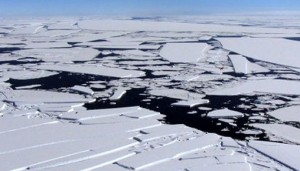This is a picture of one of the vast Antarctic ice shelves breaking up and fracturing into huge icebergs that then float northwards and melt. This happens every Antarctic summer as the frozen surface of the sea thaws. It refreezes in the winter and completes a natural cycle that is driven by the rotation of the Earth around the Sun. Clever as we see ourselves we have no influence at the solar scale. The Earth has been circling the Sun for 4.5 billion years so what is the issue?
The issue is that the ice shelves are getting smaller each year.
When they refreeze in winter they do not freeze as far; and when they thaw in the summer the melting edge creeps ever closer to the dry and barren land. This has immediate, direct and dire implications for the life that finds its food in the well-stocked acquatic larder under the ice. It has delayed, indirect, yet equally dire implications for life that does not live there – and that includes us.
As each iceberg melts the liberated water has to go somewhere – into the sea – so the average sea level rises a fraction. If enough volume of polar ice melts then the sea level may rise enough to flood low-lying land and displace the people who make their living there. Is there enough ice in the melting shelf to do this? No. That isn’t the problem. The problem is that the ice shelf does something else – it acts as a “plug” that holds back the vast ice sheet that covers the Antarctic continent. And there is a lot of it – about 5 million square miles with an average depth of 1 mile; that is about 5 million cubic miles of water-in-progress (WIP). The surface area of our oceans is around 140 million square miles – so if all the Antarctic ice slid down the hill into the sea, broke off as icebergs, floated north and melted then the sea level would rise by 5/140 ths of a mile which is 63 yards or 188 feet. Oh dear! A large proportion of our most densely populated areas lie below that new sea level.
But let us not not worry about that too much – it won’t happen in the next ten or twenty years. The idealistic-optimist-academics can always hope that Science will come to the rescue and provide innovative solutions that will avert the disaster. That is what we pay our scientists to do after all. The realistic-pessimist-pragmatists have a Plan B: we will just up sticks and move as the waters rise slowly higher. We could do with some new beach side real estate opportunities anyway! We just need to plot the 60 yard contour line and stake our claim on it early! What is all the fuss about?
It is not only the rising level of water that we need to worry about – it is something else – something that is much less tangible. We need to worry about the rising level of expectation. And we need to worry because it happens over a much short time scale and by a much greater degree.
On the global scale we have short lives and even shorter memories. We see what others have and we want the same: we want e-quality and we want it now. In the affluent countries we expect universal health, education and welfare almost as a right – in the less afflunet these are all luxuries. Those we assign the power to make it happen, our elected politicians, have the same expectations – so they get what they want. As we race to grow our economies, anyone who cannot keep up is labelled as a loser. Flat economic growth is perceived as a warning sign; and a shrinking economy is treated as a failure. The growth-at-any-cost merchants fuel the national fear with emotionally charged words such as “recession”, “depression” and “disaster”. We are brainwashed to believe that the only way to meet rising expectation is to grow bigger BUT we are doing it by squandering our future needs to satisfy our immediate wants. We are borrowing our future wealth and spending it now – with no coherent plan for settling the loan. We are living in hope and in denial. Greece, Italy and Ireland are tangible examples.
This is not sustainable: there is economic chaos that threatens to drown Europe in a rising tide of national structural debt, doubt, confusion and legally enforced austerity measures. It takes a brave person to stand up and say – this is not sustainable.
If feels as though we are at a crossroads and we appear to have only three choices:
1. Discount the issue; huddle to gether for security on our melting iceberg and hope that someone or something comes to our rescue;
2. Panic and adopt the every-man-for-himself approach, leap into the sea and swim off in all directions in the hope that some of use find unknown dry land before we drown;
3. Learn to preserve what we have and to search for new paradigms that are sustainable into the future. Learn to grow better rather than bigger and learn to meet rising expectation within the limits of the finite global resources. Learn how to improve.
Option 3 gets my vote!

